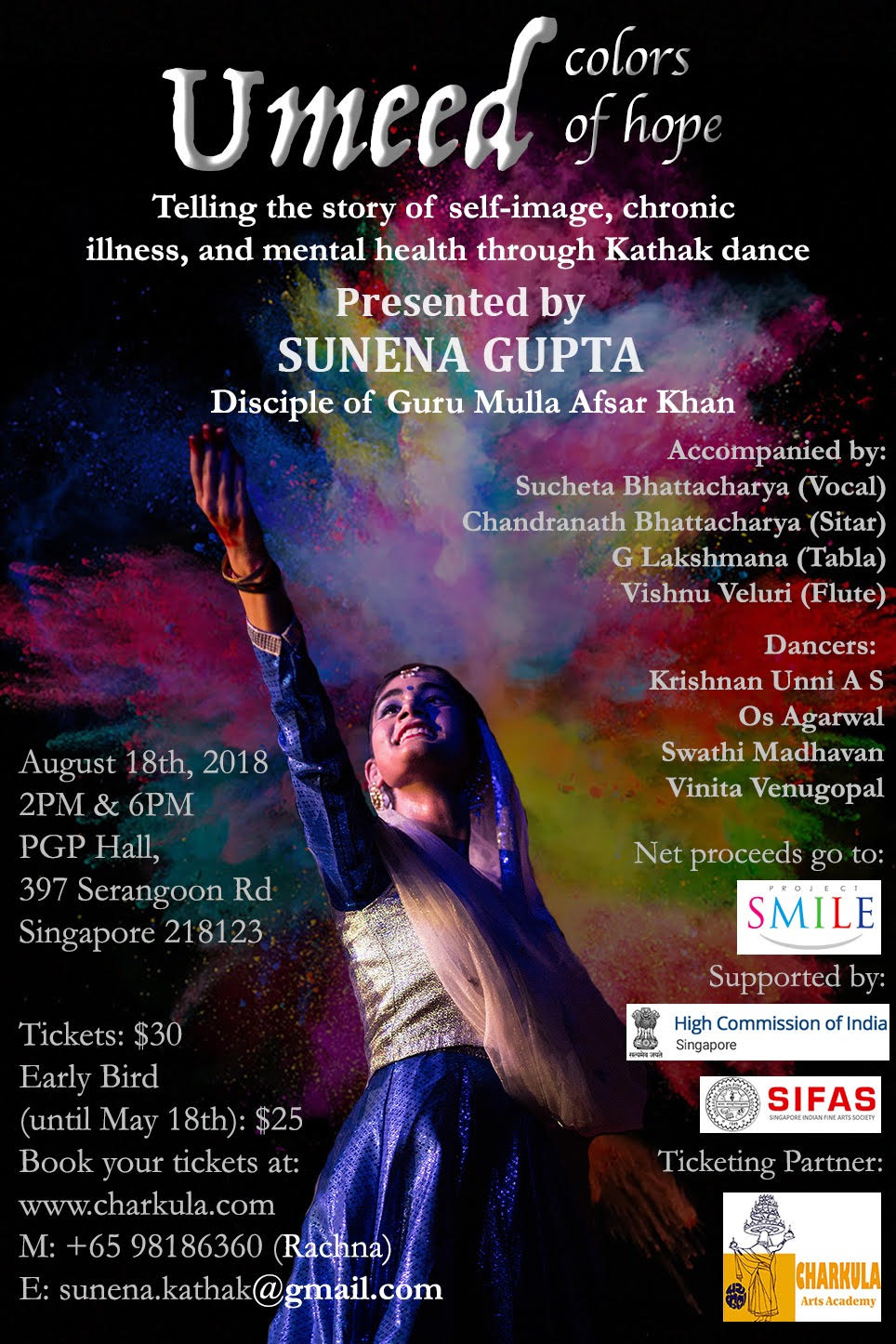
Bhanu Ramchandran talks to Sunena Gupta, a young girl whose journey to overcome self-image and mental issues caused by her chronic medical condition, is an inspiration to youngsters.
20 year old Sunena is a role model, an all-round achiever. An ace student, she is doing her Bachelors in a leading US university. She has been a basketball player in school. She plays the drums and is a Kathak dancer with several stage performances under her belt.
Her next Kathak show – titled ‘Umeed’ (meaning ‘hope’) - is one she has conceptualised herself, based on her own experiences. It aims to take the audience through her journey through the mental anguish caused by a chronic health condition, the struggle to cope with its effect on her self-image and her journey to regain her mentally wellness. Why did Sunena come up with this unusual concept for her show?
When I was introduced to Sunena, I found her a typical college girl – pretty, smart, social and active. Little could I guess the unusual challenges this young girl has had to surmount. Sunena has been braving a condition called Alopecia. An autoimmune condition, Alopecia causes loss of hair on parts of the scalp and other parts of the body. In severe case, all or most of the hair could be lost and the loss could be permanent. The person is otherwise healthy, but one can well imagine the psychological distress of facing the world with bald patches or missing eyelashes when still young.
Sunena was diagnosed with Alopecia when still a baby, at age two. Fortunately it was not very severe through her school years, and the hair generally grew back. She was receiving Homeopathic and Ayurvedic treatment, and things were under control. When she reached senior high school (Grade 11), the condition took a turn for worse and the hair loss intensified. The late teens happen to be the stage of life when adolescents take more interest in their appearance and want to appear attractive. When the hair loss increased to an extent where it was obvious, it hit Sunena hard. The friendly and active schoolgirl began feeling very conscious about her appearance, and was anxious to hide it from friends and strangers alike. Her self-image took a beating. Some days she just did not feel up to facing people, and skipped school. Naturally, her avoidance of people cost her a few friends. Around this time, Sunena, who was on the school basketball team, had to make the heart-wrenching decision to give up the sport as the sweating was affecting her treatment.
Smriti Sawheny: Struggling With An Imperfect Mirror In My Head
The dermatological treatment that Sunena tried at this time did not work for her. She went to the National Skin Centre and began a new line of treatment. She also tried hair extensions to normalise the appearance of her hair, with limited success. Through all this, Sunena’s family (parents and 2 older brothers) supported her in every way, not putting any pressure on her to attend school or go out when she did not feel like it and, very importantly, not feeling any embarrassment on her account. Her mother Rachna, her soulmate through her journey, encouraged her to keep doing the activities she enjoyed - such as dance. But even with all that, there were days when Sunena felt very low.
Fortunately for Sunena, she discovered that when one reaches out, one can find help. She opened up to her school music teacher, Mr Carl Jenkins, who was like a mentor to her. The teacher not only comforted her but also introduced her to the School Counsellor. This was the first time that Sunena had the benefit of professional help for the psychological fallout of her Alopecia.
Sunena went for regular counselling sessions, and also took a few other steps that are significant in her efforts to cope with her condition and regain mental wellness. Overcoming her anxiety, Sunena finally told a few close friends. These friends turned out to be very empathetic, extending her support network beyond her home. Through all this, Sunena was working very hard in school on her IB Diploma as well as university applications. The information on Sunena’s condition was also shared with her other teachers at school, so that they could support her when she missed school. Sunena credits the School Counsellor as a great resource and support through this time, saying that she did not need to visit outside psychologists.
Her hard work paid off, and Sunena secured admission to a very reputed university in the US. Now came the next anxiety for the family – should they send her so far from home, where she would need to carry on her fight against Alopecia and its psychological effects, all on her own? But Sunena had “had enough of stopping myself from doing something I love, on account of Alopecia”. Giving up playing her favourite sport of Basketball and cutting off many friends during her low days, had left a deep impact on her. She was determined not to let the Alopecia stop her from chasing her dreams, ever again.
Sunena resumed treatment in the US (topical treatment, injections, steroids), even as she settled in and made some good friends. But during the first half of her second year at university, Sunena suffered a severe bout of Alopecia that caused almost all her hair to fall out together. It was a sudden and huge blow for the young girl in a place far away from home and family. But Sunena is a fighter. She weighed her options and decided to fight back strongly. The first decision she made was to take a break from all treatment, as it was proving tedious, painful and not very effective. The steroids that she was taking might help somewhat but could be detrimental in the long run. Stopping the treatment was a big step to take, as it could mean that her hair may never grow back. But Sunena, with a maturity that belies her age, had decided to “accept the hair loss and learn to cope with it” rather than continue with the steroids.
She also decided to open up about her condition and its effects, in a step that proved liberating for her mental state. She had written a blog about her struggle with Alopecia, and in December of last year, her mother shared this blog with their family and friends on Facebook. The enquiries and concern poured in, mostly positive. Sunena says “the support has been overwhelming”. Revealing her hair loss condition and its effects on her, in a way freed Sunena from the anxiety of having to hide it from others, while sensitising her family and friends to her difficulties. The family received lots of supportive messages and advice from other sufferers. Sunena was introduced to a support group of Alopecia patients and she says “it has been very helpful”.
Blessed with a supportive Guru, Sunena never gave up Kathak, in spite of her struggles. Every dancer aspires to perform on stage. For a girl who had been anxious and unwilling to face even a few people, it was daunting to dance on stage in front of hundreds. Encouraged by her family and Guru, dance she did, a couple of years ago, to a large audience and with great success! Her confidence fired up, Sunena followed up her stage debut with a couple more performances.
The whole experience of sharing her story through her blog and the encouraging response Sunena got, sowed the seed of the idea to tell her story through her dance. Umeed is choreographed by Sunena’s Guru Mulla Afsar Khan (Kathak Guru at SIFAS) based on her concept and inputs. On the title ‘Umeed – colors of hope’ Sunena explains, “I want others to understand from my journey that no matter how low you feel, it is possible to deal with it and regain mental wellness, I want them to feel that hope”. “We have used colours and seasons to denote the light and dark phases, the ups and downs” (one goes through when facing a chronic illness and psychological distress).

Sunena’s quiet confidence in her dance and her vision to help others by sharing her story, convinced me that mental health issues can be tackled with hope and support. I have booked tickets for her show Umeed on 18 August, and look forward to seeing her story inspire others towards mental wellness!
Contributed by Club2Care Singapore. Join the Club2Care community here.
Club2Care Singapore is an organisation which aims to offer a helping hand to people with emotional distress and mental health issues and their families in a culturally supportive environment so that they feel acception and empowered. If you or anyone you know needs help, contact Club2Care






